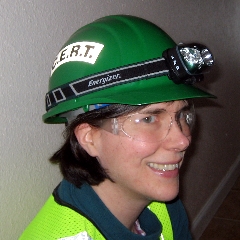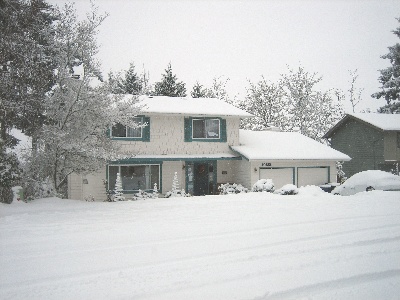
|
Emergency Preparedness:
Awareness & Education
Gayle Elam
Seattle area
|
Emergency Preparedness Basics
Disasters are major events that can strike anywhere and at any time. Any preparedness step we take today will put us in a greater position for resiliency, whether from a major earthquake, a winter storm, an extended power outage, a terrorist act, or a pandemic flu outbreak.
Preparing yourself, your family, and your neighborhood is vital. Families and neighbors who are prepared are more effective in their response to a disaster and more capable of being self-sufficient for the first 72 hours after a disaster. Immediately after a disaster, traditional 9-1-1 and First Responder capabilities (fire, police, medics, and utility personnel) will be overwhelmed and unable to assist individuals as quickly as they usually do. In fact, after a large disaster it can take 3-7 days to get professional help. Your most immediate source of help are the neighbors living around you.
First Steps to Preparedness
First, start by preparing yourself and your family. Don't be afraid to ask for help, from me or others. Pick something and do it today, or this weekend! Next, get involved in preparing your neighborhood.
Step #1: Prepare yourself and your family.
- 3 Days, 3 Ways, Are You Ready? -- Be ready to survive on your own for a minimum of 3 Days following a disaster. Become prepared in 3 Ways – Make a Plan, Build a Kit, and Get Involved.
- "Prepare in a Year" -- Choose one hour each month to complete a designated preparedness activity.
Step #2: Prepare your neighborhood.
Neighborhoods that are prepared for emergencies and disaster situations save lives, reduce the severity of injuries and trauma, and reduce property damage. Neighbors participating in the program "Map Your Neighborhood":
- Learn the 9 steps to take immediately following a disaster.
- Develop a neighborhood skills and equipment inventory.
- Map the neighborhood and identify areas of concern such as gas meters.
- Verify which neighbors need extra help in a disaster such as the elderly, those with a disability, or children who may be home alone.
In our city, an emergency management specialist teaches a "train the trainer" session to neighborhood team leaders, who then work with their neighbors to improve everyone's preparedness. Another benefit of the program is that working together as a team and contributing as an individual develops stronger communities and improves the quality of life in the community.
Our Story
Recent Events
I live in the Seattle area with my husband Tim and our two young children. Washington is subject to most kinds of natural disasters. We have experienced enough reasons to motivate our family to get prepared! Since 2000, we have ourselves experienced:
 |
- a significant earthquake (magnitude 6.7, 45 seconds of shaking) - scary, but luckily small effects for us (Nisqually earthquake, February 28, 2001)
- a small wildfire (I wasn't sure what I should take with us in case it spread across the main road to our neighborhood)
- multiple winter snow and ice storms (stuck at home for several days, several times including December 2008)
- a 60+ mph windstorm that toppled trees and caused an extended power outage during a cold snap (Hannukah Eve Windstorm, December 2006)
- simultaneous closures of I-5 between Seattle and Portland and all mountain passes to Eastern Washington, leaving the Seattle area an "island" only accessible by plane (January 2009)
- a medium-sized earthquake (magnitude 4.5, 10-15 seconds of shaking) 14 miles northwest of Seattle, near Kingston, Kitsap County, at a depth of 36 miles did no structural damage but was big enough to briefly knock out the regional earthquake emergency alert system (5:25 a.m. on January 30, 2009)
|
Also in that timeframe, one of Tim's cousins lost his home and his livelihood in Hurricane Katrina, and many friends and family members have been affected by other hurricanes.
Taking Stock, Getting Prepared
After the experience of the windstorm power outage (5 day outage and 40 degrees inside; 11 day outages nearby), my whole family has gotten into emergency preparedness. The kids get involved too. We have all worked on emergency supplies kits, our fire escape plan, and earthquake drills. I've gotten trained -- I took a CERT class, I got certified in First Aid & CPR, and Tim and I are getting involved in Amateur Radio emergency communications. My 4-year-old son loves to call out “Earthquake!” and have us scurry to our safe spots. My 6-year-old daughter thinks she'd like to have a short power outage or small earthquake so we can use our stuff. (I tell her we can turn the power off for the weekend, but we can only pretend about earthquakes unless one happens!)
Here are some of the things that we have done to get our family prepared. Many of them were driven by reducing problems in the future -- for example, we never want to be frozen out of our own home again! And we want everyone to be able to check in successfully in case we are separated during a disaster (home, school, work, playdate, etc.).
- Staying warm -- mummy sleeping bags for the kids (we had ours already), a wood stove insert for our fireplace, and a small generator.
- Quick getaway -- pre-packed toiletries, medicines, underwear and socks, and change of clothes. It is easy to buy extra clothes at Goodwill, Wal-Mart, or wherever, as we did when we were gone longer than expected. Prescription medications are trickier though, so best to have enough of those with you.
- Food and water -- At home and in the car. In the car, we keep food and water, cups, plates and utensils in a storage container in the trunk, and we test it out by declaring a "car picnic". Besides emergencies, it is useful for the roadtrips to my parents' house, staying out longer than expected, or impromptu trips to the lake. (Plus my daughter is allergic to peanuts, so having our own food can also be a safety issue.)
- Contact & Medical Info -- Long distance phone lines, text messages, and email are most reliable in a disaster. Local phone lines often don't work. "Out-of-Area" family contacts are the relay point to share information with all family members. Write down your local and out-of-area contacts, and make sure that everyone in the family has a copy (in kids' backpacks, adults wallets, etc.) and knows to call the out-of-area contact. Also write down important medical conditions and any medications you take.
- First Aid & CPR -- Always good to know First Aid and CPR to take care of loved ones and others!
- Disaster Skills -- This fall I completed an 8 week CERT training class (the Citizen Corps program designed to prepare you to help yourself, your family, and your neighbors in the event of a disaster). I now have basic skills in extinguishing small fires, turning off utilities, light search and rescue, and basic medical treatment.
- Amateur radio -- Ham radios are often used to communicate in an emergency when standard phone lines and power are out. My husband and I both got our amateur radio licenses this winter.
We hope that we are over-prepared for nothing much (like the earthquake 8 years ago) rather than under-prepared for "The Big One"! We hope that you will be too.
Resources
First Steps to Preparedness
- 3 Days, 3 Ways, Are You Ready? -- Personal and Family Preparedness. Be ready to survive on your own for a minimum of 3 Days following a disaster. Become prepared in 3 Ways – Make a Plan, Build a Kit, and Get Involved.
- "Prepare in a Year" -- Personal and Family Preparedness. Choose one hour each month to complete a designated preparedness activity.
- "Map Your Neighborhood" -- Neighborhood Preparedness. Preparing your neighborhood is vital. Neighbors will likely be the first ones to offer you assistance. Neighbors that are prepared are more effective in their response to a disaster and have an increased capacity to be self-sufficient for the first 72 hours after a disaster.
Get Trained
- CPR & First Aid -- Learn from The American Red Cross, Evergreen Hospital, or other local resources.
- CERT (Community Emergency Response Teams) -- Learn lifesaving skills to help yourself, your family, and your neighbors (extinguishing small fires, light search & rescue, basic medical treatment).
More about Kits, Action Plans, and Preparedness
- 3 Days, 3 Ways, Are You Ready? -- Be ready to survive on your own for a minimum of 3 Days following a disaster. For large disasters, you may not receive any government assistance for up to 7 Days. Become prepared in 3 Ways – Make a Plan, Build a Kit, and Get Involved.
- Disaster Preparedness -- Personal, Schools, Neighborhoods, Business (Washington Military Department, Emergency Management Division)
- The American Red Cross -- First Aid, Preparedness, Disaster Response, etc.
- Citizen Corps, which is affiliated with the Department of Homeland Security says "We all have a role in hometown security. Citizen Corps asks you to embrace the personal responsibility to be prepared; to get training in first aid and emergency skills; and to volunteer to support local emergency responders, disaster relief, and community safety." One Citizen Corp program is Community Emergency Response Team (CERT). CERT classes teach lifesaving skills to help yourself, your family, and your neighbors during a disaster (extinguishing small fires, light search & rescue, basic medical treatment).
- Ready America -- The Department of Homeland Security urges us to "Prepare. Plan. Stay Informed." 1. Get A Kit. 2. Make A Plan. 3. Be Informed.
- Ready Kids -- Kids message from the U.S. Department of Homeland Security
- Let's Get Ready! Planning Together for Emergencies -- Sesame Workshop develops family friendly resources on Emergency Preparedness, in collaboration with the Department of Homeland Security's Ready Kids initiative. Fun and easy ways to help the whole family prepare for any type of emergency.
Amateur Radio (Ham Radio)
|
Last Modified: February 8, 2009 |
 |


